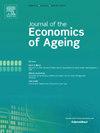Declining financial and health literacy among older men and women
IF 2
3区 经济学
Q2 DEMOGRAPHY
引用次数: 0
Abstract
Financial and health literacy decline at older ages, and such deterioration in later life is associated with adverse outcomes. Nevertheless, it is unclear whether the rate or likelihood of decline diverges over time across subgroups of the elderly. This study used longitudinal data to assess whether older men and women differ in the likelihood and rate at which their financial and health literacy deteriorates. After assessing their financial and health literacy using a 32-item measure at baseline, we surveyed 1,075 community-resident older adults without dementia at baseline, and followed them annually thereafter, for an average of six waves. We document that the average financial and health literacy score at baseline was 69.6% (out of 100%), falling by about one percentage point per year on average. Men score 3.6 percentage points higher than women at baseline, but their likelihood and rates of decline over time do not differ from women’s, controlling for age, income, education, and medical conditions. Similar patterns were observed for financial and health literacy separately. The financial and health literacy gender gap persists as people age, suggesting that efforts to improve financial and health literacy among both women and men prior to old age would help but would not close the gender differential in financial and health literacy.
老年男女的金融和卫生知识水平下降
金融和卫生知识普及程度在老年人中下降,而这种在晚年生活中的恶化与不良后果有关。然而,目前尚不清楚,随着时间的推移,在不同的老年人亚群中,这种下降的速度或可能性是否存在差异。这项研究使用纵向数据来评估老年男性和女性在财务和健康素养恶化的可能性和速度上是否存在差异。在基线时使用32项测量方法评估了他们的财务和健康素养后,我们调查了1075名基线时没有痴呆症的社区居民老年人,此后每年对他们进行平均六次跟踪调查。我们记录了基线时的平均金融和健康素养得分为69.6%(满分为100%),平均每年下降约一个百分点。在基线时,男性的得分比女性高3.6个百分点,但在控制了年龄、收入、教育和医疗条件后,他们随时间下降的可能性和速度与女性没有什么不同。在金融和健康素养方面也分别观察到类似的模式。随着人们年龄的增长,金融和卫生知识的性别差距仍然存在,这表明,在老年之前提高男女金融和卫生知识的努力将有助于消除金融和卫生知识方面的性别差异,但不会消除这种差异。
本文章由计算机程序翻译,如有差异,请以英文原文为准。
求助全文
约1分钟内获得全文
求助全文
来源期刊

Journal of the Economics of Ageing
Multiple-
CiteScore
4.10
自引率
4.50%
发文量
46
审稿时长
49 days
期刊介绍:
The Journal of the Economics of Ageing (JEoA) is an international academic journal that publishes original theoretical and empirical research dealing with the interaction between demographic change and the economy. JEoA encompasses both microeconomic and macroeconomic perspectives and offers a platform for the discussion of topics including labour, health, and family economics, social security, income distribution, social mobility, immigration, productivity, structural change, economic growth and development. JEoA also solicits papers that have a policy focus.
 求助内容:
求助内容: 应助结果提醒方式:
应助结果提醒方式:


